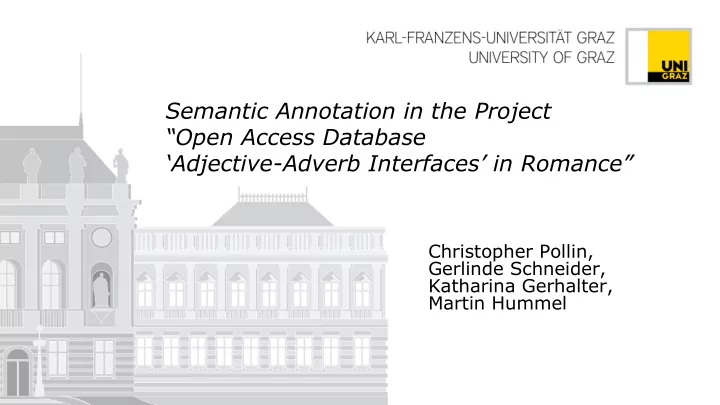

Semantic Annotation in the Project “Open Access Database ‘Adjective-Adverb Interfaces’ in Romance” Christopher Pollin, Gerlinde Schneider, Katharina Gerhalter, Martin Hummel
Open Access Database "Adjective-Adverb Interfaces in Romance" Open Research Data Pilot, Austrian Science Fund ● September 2017 to December 2019 ● PI : Martin Hummel (Institute for Romance Studies) ● Data acquisition : Katharina Gerhalter (Institute for Romance ● Studies) Data modelling : Gerlinde Schneider and Christopher Pollin ● (Centre for Information Modelling) https://adjective-adverb.uni-graz.at/de/forschen/projekte/open-access-database-2017-2019/
Research group Investigates relations between the word classes of adjective and adverb in Romance languages Research data as an output from several projects and publications ➔ Complex linguistic annotations ➔ Annotation model is developed further for new requirements ➔ Degree and emphasis of the annotation varies ➔ Multilingual data ➔
Objectives ● Possibilities and challenges of open linguistic research data ● Comprehensive database for the diverse data of the research group ● Querying across corpora and languages ● Open access to linguistically annotated data in a reasonable way - via standardized formats and interfaces ● Long-term availability and preservation of the data In this talk: Using semantic technologies to reach these aims
Adjective-Adverb Interfaces ~ Adjectives with adverbial function Adjective-Adverbs ver claro Inflected Adverbs altos subieran los fumos Discourse markers cierto Adverbial prepositional phrases de seguro Mostly in substandard language and regional varieties
Annotation of AA-Interfaces Syntactic information (eg. relative word order) Morphosyntactic information (eg. word class) Semantic information (eg. semantic target) → Adjective-Adverbs + entities that relate to the AA Verb; Subject of the AA construction; Preposition + Article/ + Possessive
Annotated Corpora ● French: Dictionnaire Historique de l’Adjectif-Adverbe (dicoadverbe) ○ > 13.000 examples, 11th - 20th century ● Spanish: Reading corpus for Sintaxis Histórica de la Lengua Española (2014, Company Company) - Martin Hummel “Los adjetivos adverbiales” ○ > 1.200 examples, 13th - 21st century ● Spanish: Corpus on diachrony of Spanish ○ > 2.200 examples, 13th - 21st century
(1) [...] este pujamiento dell agua que fuera tanto en alto porque tan altos subieran los fumos de los sacrificios que los de Caím fizieran a los ídolos (1252-1284; Alfonso X; General Estoria. Primera Parte; p. 55, SH3) (2) [...] tan [a::alto::altos:: apvmln ] [v::subir::subieran::i] [s::los fumos::mp] e los sacrificios
Categories for Adverb Annotation
Related work ● Linguistic Linked Open Data Cloud (LLOD) ● Ontologies of Linguistic Annotations (OLiA) [Chiarcos et al., 2016] ● NLP Interchange Format (NIF) [Hellmann et al., 2013] → Standardized URI schemas, REST interfaces, RDF, RDF/OWL-based ontologies
AAIF-Ontology “ a formal, explicit specification of a shared conceptualization ” [Brost, 1995]
AAIF Ontology WebVOWL
http://gams.uni-graz.at Stigler, J. H., & Steiner, E. (2018)
WORD to (not the best) TEI <s>e dize maestre Pedro que este pujamiento tan dell aguaque fuera tanto en alto porque [a::alto::altos:: apvmln ] <phr type="syntagm">tan <w type="adverb" lemma="alto" [v::subir::subieran::i] function="apvmln">altos</w> [s::los fumos::mp] <w lemma="subir" function="i" e los sacrificios type="verb">subieran</w> <w type="subject" function="mp"> los fumos</w> 1. Morphosyntactic structure: a djective de los sacrificios 2. Inflection: masculine p lural </phr> 3. Attribution target v erb 4. Modified yes que los de Caím fizieran a los ídolos, e que se 5. Semantic Classification l ocation lavasse de la suziedat d'aquellos fumos ell 6. Reduplication n o aire. </s>
<aaif:Subject rdf:about="#Entry-274-Phrase-1-Subject-1"> RDF <aaif:text>los fumos</aaif:hasText> <aaif:genus rdf:resource="/o:aaif.ontology#Masculine"/> <aaif:numerus rdf:resource="/o:aaif.ontology#Plural"/> </aaif:Subject> <aaif:Entry rdf:about="#Entry-274"> <aaif:Verb rdf:about="#Entry-274-Phrase-1-Verb-1"> <aaif:phrase rdf:resource="#Entry-274-Phrase-1"/> <aaif:text>subieran</aaif:hasText> <gams:XMLContent rdf:parseType="XMLLiteral"> <aaif:lemma>subir</aaif:lemma> <phr type="syntagm">tan <aaif:syntacticConstruction <w type="adverb" lemma="alto" function="apvmln"> rdf:resource="/o:aaif.ontology#Intransitive"/> altos</w> <w type="verb" lemma="subir" </aaif:Verb> function="i">subieran</w> <w type="subject" function="mp">los fumos</w> de los sacrificios <aaif:Adverb rdf:about="#Entry-274-Phrase-1-Adverb-1"> </phr> <aaif:text>altos</aaif:hasText> </gams:XMLContent> <aaif:lemma>alto</aaif:lemma> </aaif:Entry> <aaif:morphosyntacticStructure rdf:resource="/o:aaif.ontology#Adjective"/> <aaif:inflection <aaif:Phrase rdf:about="#Entry-274-Phrase-1"> rdf:resource="/o:aaif.ontology#MasculinePlural"/> <aaif:subject <aaif:attributionTarget rdf:resource="#Entry-274-Phrase-1-Subject-1"/> rdf:resource="/o:aaif.ontology#Verb"/> <aaif:verb rdf:resource="#Entry-274-Phrase-1-Verb-1"/> <aaif:modified>true</aaif:modified> <aaif:adverb <aaif:semanticClassification rdf:resource="#Entry-274-Phrase-1-Adverb-1"/> rdf:resource="/o:aaif.ontology#Location"/> </aaif:Phrase> <aaif:reduplication>false</aaif:reduplication> </aaif:Adverb>
http://glossa.uni-graz.at/archive/objects/query:aaif.getsh3/methods/sdef:Query/get SPARQL SELECT ?Adverb_text ?Adverb_lemma ?Verb_text ?Verb_lemma ?Entry_text { #get SH3 corpus, text and XML ?Entry gams:isMemberOfCollection <https://gams.uni-graz.at/o:aaif.sh3>; aaif:phrase ?Phrase; gams:textualContent ?Entry_text; gams:XMLContent ?XMLContent. #get Adverb ?Phrase aaif:adverb ?Adverb. ?Adverb aaif:text ?Adverb_text; aaif:lemma ?Adverb_lemma. #get Verb OPTIONAL{ ?Phrase aaif:verb/aaif:text ?Verb_text. ?Phrase aaif:verb/aaif:lemma ?Verb_lemma. } #further criterias for the adverb ?Adverb aaif:morphosyntacticStructure <https://gams.uni-graz.at/o:aaif.ontology#Adjective>. { ?Adverb aaif:inflection <https://gams.uni-graz.at/o:aaif.ontology#MasculinePlural>. } UNION { ?Adverb aaif:inflection <https://gams.uni-graz.at/o:aaif.ontology#FemininePlural>. } ?Adverb aaif:attributionTarget <https://gams.uni-graz.at/o:aaif.ontology#Verb>. }
Conclusion Long-term preservation: self-describing data and model ● Domain-specific ontology: flexible - interoperable - transparent ● Linked Open Data ● Word → TEI → RDF ● Search interface ● Challenges Overlapping structures and different levels of annotation ● Keeping sequence of text ●
Recommend
More recommend